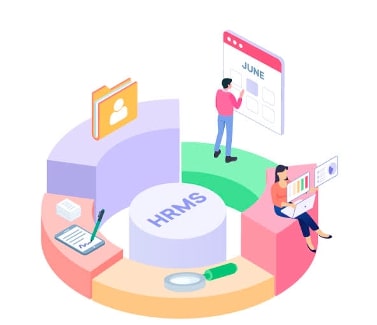Image Source:- istockphoto
The world of recruitment has seen a major shake-up in recent years. Gone are the days when recruiters and hiring managers had to rely on either their gut instinct or word-of-mouth to select the best-suited candidates for their business.
Businesses are increasingly becoming reliant on technology. Recruiters are taking advantage of Human Resource Management Software (HRMS) to help them fill positions to save time and money. Thus, AI-powered HRMS is transforming the HR landscape globally rapidly.
What is HR Management Software?
HRMS is a combination of software applications that are used to handle all processes throughout the employee lifecycle. It is used to perform various activities such as recruitment, onboarding, managing employee files, tracking attendance, performance evaluation, and issuing compensation. In short, it’s an all-in-one solution for managing your workforce.
Top 7 Benefits of HR Management Software
Image Source:- Shutterstock
While there are many benefits of using human resource management software, here are the top seven of them:
1. Saves Time and Money
Many businesses are now turning to HR management software to help them manage their employee data. This software can save time and money by automating key processes such as payroll and benefits administration.
In addition, hiring managers no longer have to spend hours gathering information on potential employees; the software does all the hard work for them. By using HR management software, businesses can improve their HR department’s output and boost productivity.
2. Makes The Recruitment Process More Efficient
Businesses can use HR management software to create job postings, accept and review resumes, track employee performance, and more. By using HR management software, companies can improve the efficiency of their talent recruitment process while also reducing costs. Because selecting the right candidate for your company is a time-consuming process, and time is money.
HR management software allows businesses to perform talent planning quickly, saving time and money in the long run. With HR management software, all of your recruitment resources are in one place, so that you can find everything you need immediately.
3. Helps Monitor Employee Performance
Many businesses are turning to HRMS to monitor employee performance better. By tracking employee hours and attendance, companies can get a good idea of who is more productive and might need some additional support. Additionally, employers can use this data to identify any potential issues before they become bigger problems.
HRMS can also be used to create custom reports on employee productivity. This information can then help make informed decisions about staffing levels, bonuses, and other compensation measures.
Overall, HRMS makes business run more efficiently and effectively.
4. Helps To Keep Track of Employee Files
One of the benefits of using HR management software is that it helps keep track of employee files.
All important information about your employees is stored in one, easy-to-access place. This means that managers can quickly access all the necessary documents whenever they need them.
Additionally, if you ever have to terminate an employee, you will have all the information you need right at your fingertips. Having a centralized system for employee files makes life a lot easier for managers, and it can help keep your business running smoothly.
If you want to streamline your HR processes, consider using an HR management software solution. It sure does make your life a lot easier!
5. Improves Communication
HRMS is especially helpful for businesses that have multiple branches. HRMS improves communication between managers and employees. They can use the software to send out reminders, updates, and other important information. And employees can use it to ask questions or share feedback.
Overall, using HR management software can help your business improve communication in several ways. By connecting with employees in new and innovative ways, you can help keep your team connected and working together towards common goals.
6. Eliminates Human Errors
The HR department plays an important role in every company. There are many processes involved in HR management, such as compliance, recruitment, payroll management, performance management, etc., which can take up a lot of time and resources when done manually.
However, manual processes tend to be more prone to errors. HRMS reduces human errors by automating these processes, enabling companies to provide better service.
Therefore, businesses are increasingly integrating HRMS software, thus freeing up their HR personnel so they can focus on other initiatives.
7. Promotes Paperless Workflow
Many companies are now moving toward ‘going green’ processes in order to reduce waste and in turn save a substantial amount of money along the way. HRMS is an automated, paperless system, which is why so many companies are taking advantage of it.
Once fully implemented, paperless HRMS cuts down on expenditures for printing supplies and ink cartridges. In addition, it is a great way of becoming an eco-friendly brand.
Viewing documents electronically can save time, as well. For example, instead of signing a document the old-fashioned way, many companies now prefer an electronic signature. Furthermore, since payroll is now being done digitally, with HRMS it is now possible and much easier to keep track on payout.
HRMS vs HRIS vs HCM?
Image Source:- istockphoto
As information technology has been progressing rapidly, companies are seeking new automation tools to make life easier and save time and effort. Because today, time is money. This new approach is giving birth to a new system every minute. When it comes to the HR landscape, the scenario is the same.
Let’s take HR software, for instance. There are HRMS, HRIS, and HCM. Each of these systems has its functionality.
HRMS: Human Resource Management System
HRIS: Human Resource Information System
HCM: Human Capital Management
All three systems perform common tasks such as automate progress reviews; monitor employees’ working hours; track salary payout, overtime, and bonus; maintain contact information of job applicants, potential hires, and current employees; administer and track benefits; and identify workforce needs. However, HCM, HRMS, and HRIS have some unique functionalities.
| HRMS | HRIS | HCM |
| Time and Labour Management | Absence Management | Employee Performance |
| Compensation Management | Position Control | |
| Self-service Portal | Global Support | |
| Personnel Tracking | Onboarding | |
| Payroll Processing | Recruiting | Analytics |
| Workflow Management | HR Services | |
| Training and Development | ||
| Benefits Management |
How To Choose The Right Software for Your Business Needs
HR management software is a tool used by businesses of all sizes. Therefore, it’s important to find scalable software that fits the specific needs of your business.
It would help if you consider the cost of the software and the customer support offered by the company.
It’s also essential to ensure that the software provider you choose has a good reputation for providing good customer service and is accessible at all times.
The best way to find the right company for you is by researching their products and services before making a decision. You can also ask around about which companies are most trustworthy.
Final Conclusion
The goal of HR management software is to help your employees achieve their fullest potential. For this to happen, you need a system that can manage the entire employment lifecycle: from sourcing and onboarding talent to managing performance reviews and payroll. AI-powered Talent Intelligence Platform like Eightfold.ai offers all these services in one place.


